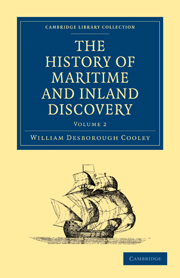Book contents
- Frontmatter
- Contents
- CHAP. I COLUMBUS
- CHAP. II COLUMBUS AND AMERIGO VESPUCCI
- CHAP. III EARLY DISCOVERIES IN AMERICA
- CHAP. IV SPANISH DISCOVERIES, AND FIRST CIRCUMNAVIGATION OF THE EARTH
- CHAP. V FERNANDO CORTEZ
- CHAP. VI CONQUEST OF PERU
- CHAP. VII CONQUESTS OF THE SPANIARDS
- CHAP. VIII CONQUESTS OF THE PORTUGUESE
- CHAP. IX FERDINAND MENDEZ PINTO
- CHAP. X VOYAGES TO THE NORTH
- CHAP. XI VOYAGES TO THE NORTH
- CHAP. XII VOYAGES TO THE NORTH
- CHAP. XIII SETTLEMENTS IN THE EAST
- CHAP. XIV SETTLEMENTS IN NORTH AMERICA
- CHAP. XV ESTABLISHMENTS IN AFRICA
- CHAP. XVI VOYAGES TO THE SOUTH SEA
- CHAP. XVII VOYAGES TO THE SOUTH SEA
- CHAP. XVIII VOYAGES IN THE PACIFIC, AND DISCOVERY OF AUSTRALIA
- CHAP. XIX EXPEDITIONS OF THE BUCCANEERS IN THE SOUTH SEAS
- CHAP. XX VOYAGES OF PRIVATEERS AND OTHERS TO THE SOUTH SEA
- CHAP. XXI DISCOVERIES OF THE RUSSIANS
- CHAP. XXII DISCOVERIES OF THE RUSSIANS
CHAP. X - VOYAGES TO THE NORTH
Published online by Cambridge University Press: 05 October 2010
- Frontmatter
- Contents
- CHAP. I COLUMBUS
- CHAP. II COLUMBUS AND AMERIGO VESPUCCI
- CHAP. III EARLY DISCOVERIES IN AMERICA
- CHAP. IV SPANISH DISCOVERIES, AND FIRST CIRCUMNAVIGATION OF THE EARTH
- CHAP. V FERNANDO CORTEZ
- CHAP. VI CONQUEST OF PERU
- CHAP. VII CONQUESTS OF THE SPANIARDS
- CHAP. VIII CONQUESTS OF THE PORTUGUESE
- CHAP. IX FERDINAND MENDEZ PINTO
- CHAP. X VOYAGES TO THE NORTH
- CHAP. XI VOYAGES TO THE NORTH
- CHAP. XII VOYAGES TO THE NORTH
- CHAP. XIII SETTLEMENTS IN THE EAST
- CHAP. XIV SETTLEMENTS IN NORTH AMERICA
- CHAP. XV ESTABLISHMENTS IN AFRICA
- CHAP. XVI VOYAGES TO THE SOUTH SEA
- CHAP. XVII VOYAGES TO THE SOUTH SEA
- CHAP. XVIII VOYAGES IN THE PACIFIC, AND DISCOVERY OF AUSTRALIA
- CHAP. XIX EXPEDITIONS OF THE BUCCANEERS IN THE SOUTH SEAS
- CHAP. XX VOYAGES OF PRIVATEERS AND OTHERS TO THE SOUTH SEA
- CHAP. XXI DISCOVERIES OF THE RUSSIANS
- CHAP. XXII DISCOVERIES OF THE RUSSIANS
Summary
The conquests of the Spaniards and Portuguese in the New World and the East present such a brilliant train of exploits and discoveries as must always hold a prominent place in an historical review of geographical knowledge. But other nations in the mean time were not inattentive to these movements, or indifferent to the advantages that might result from an improved acquaintance with the globe. They did not proceed, it is true, in their researches with the same bold strides; but their slow and patient efforts were of a nature better calculated to conduct to ultimate success. England in particular soon distinguished itself as the school of intrepid and skilful mariners.
John Gavotta or Cabot, a native of Venice, arrived in England, and settled at Bristol, in the reign of Henry VII. That monarch, disappointed in his hopes of forming an engagement with Columbus, gladly extended his protection to the Venetian, whose reputation as a skilful pilot was little inferior to that of the celebrated Genoese. By a patent dated the 5th of March, 1496, he granted to Cabot and his three sons, Louis, Sebastian, and Sancius, permission to go in search of unknown lands, and to conquer and settle them. In the accounts which remain to us respecting the voyages undertaken in virtue of this patent, irreconcilable diversities and contradictions occur. Of Sebastian Cabot alone we know any thing with certainty.
- Type
- Chapter
- Information
- The History of Maritime and Inland Discovery , pp. 136 - 151Publisher: Cambridge University PressPrint publication year: 2010First published in: 1830



